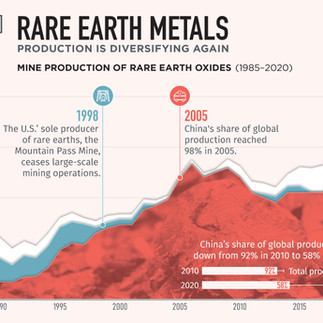China and rare earth minerals: a powerful weapon in geopolitics
- Oct 26, 2025
- 2 min read
In recent weeks, China and the United States have intensified their struggle for control over the rare earth minerals market — a group of 17 chemically similar elements that are crucial for manufacturing many high-tech products. They are used in computer hard drives, smartphones, military defense systems, LED lights, electric car motors, and jet engines.
In 2024, the International Energy Agency (IEA) estimated that China accounts for about 61% of rare earth production and 92% of its industrial processing. Due to environmental regulations and high labor costs, the United States stopped processing these rare minerals in the early 2000s, allowing China to become the dominant player in this sector.
Two weeks ago, Beijing announced that it would impose strict controls on the export of its rare earth minerals. China justified this measure by arguing that the United States — first under the Biden administration and now under Trump — has banned companies and governments around the world from selling to China semiconductors produced with U.S. technology. China also claimed that the U.S. has recently imposed many tariffs and that these export controls aim to prevent the U.S. from gaining military advantages from these components.
In response, two days ago it was announced that the United States and Australia will begin joint investments worth $8.5 billion to increase rare earth extraction and processing. According to the White House, this could yield a benefit of $53 billion.
Australia has the fourth-largest rare earth deposit in the world and is the second-largest producer. It also became the world’s top destination for rare earth exploration investments, securing $64 million — about 45% of global investment in such projects last year. Additionally, it produces roughly half of the world’s lithium, a key mineral for manufacturing electric vehicle batteries.
In summary, just as Saudi Arabia is essential for U.S. energy security, Australia may become its equivalent in technological security.












Comments